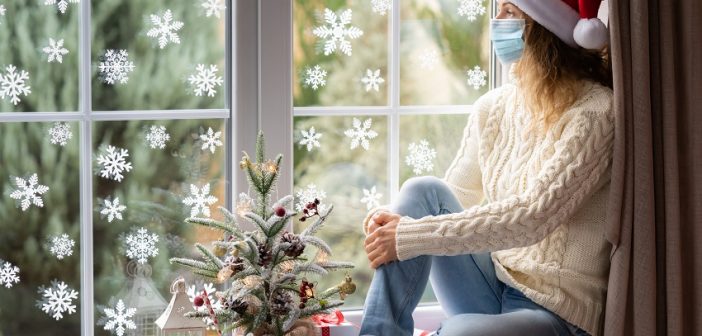We’d all hoped to have the worst of the COVID-19 pandemic behind us by the end of 2020. And while there is hope that effective vaccines will be rolled out soon, it won’t come in time to make it safe to gather again for the holidays. There’s light at the end of the tunnel, but we all have to be careful in the meantime.
So what does that mean for your holiday traditions? Will you have to skip visiting your family? How can you minimize COVID risk while still making the most of the holiday season? It isn’t an easy decision, but here are some tips for keeping risks low, whatever you decide to do.
Wear a Mask
By now, we all know that wearing a mask with two or more layers can significantly cut down on virus transmission, especially in settings where it’s impossible to social distance, such as in crowded areas or indoors. If you’re going to be participating in holiday festivities with people who don’t live in the same household, it’s very important to wear a mask in order to keep everyone safe.
Obviously, you can’t eat with a mask on. It’s always better to keep your mask on throughout your visit, but if you can’t, you should sit apart from people outside your household and bring your own utensils, cups, plates, and even food and drinks. Avoid going in and out of the kitchen.
Consider planning holiday gatherings centered on activities other than dinner, which will allow guests to wear masks at all times. Or, eat dinner virtually with friends and families. That’s the only really safe way to enjoy mask-free socializing right now.
If You’re Feeling Unwell, Don’t Travel
Traveling is very risky right now. With cases rising in nearly all states, it’s safest to stay home and enjoy the holidays with others in your household. But if you do choose to travel, be sure to monitor your health carefully.
Be prepared to change your plans if necessary. If you’re not feeling well when it’s time for you to start your journey, you should immediately cancel your travel plans. It’s not worth the risk of infecting others. Also, be sure to check any travel restrictions and get tested if you need to.
According to Jana Zwilling, M.S., a clinical assistant professor in the Online Master of Science in Nursing program at the University of North Dakota, “what I am seeing in our communities is just a lack of attention; Impromptu gatherings with asymptomatic friends, no mask, and distancing not being followed. However, I believe the recent “spikes” are more related to colder weather in our northern states. More of us are inside without the benefit of fresh air and easily maintained distances.”
Find a Go To Source for Accurate and Peer-Reviewed Information
Unfortunately, the pandemic has led to a lot of misinformation being spread. You should be skeptical of what you hear on social media and find a go-to source for accurate, peer-reviewed information about the pandemic and minimizing risks.
This is a great time to develop your health literacy skills and learn how to identify reliable sources for public health information. Because our knowledge of COVID-19 is still emerging, you shouldn’t be quick to believe everything you read. Find unbiased, scientific sources, not just articles and statistics that support your opinions.
Wash Your Hands to Prevent Spread of Germs
The COVID-19 virus is airborne, but that doesn’t mean you can stop washing your hands and using hand sanitizer. It’s important to continue preventing the spread of germs by regularly washing your hands for at least 20 seconds and disinfecting surfaces, especially when you are touching objects outside your home this holiday season. Remember, it’s also flu season!
It’s also important not to touch your face. If you touch something that has been contaminated with the COVID-19 virus and you touch your face, you could easily contract the virus yourself. Be aware of what you’re touching and how often you’re sanitizing your hands.
It’s also important to watch your diet and be mindful of what you’re eating.
“There are many things families can do to stay healthy and support their immune systems. Getting adequate sleep and rest, having daily physical activity, breathing some fresh air every day, and consuming a diet consisting of fresh foods are all key to a strong immune system,” adds Professor Zwiling.
Stay Alerted to Public Health Information & Recommendations
The COVID-19 pandemic is an evolving crisis. With cases rising, it’s difficult to predict how risky holiday activities will be even next week. It’s important to pay attention to public health data and information from your state and the CDC and to follow their guidelines to prevent the spread of the virus as much as possible.
This holiday season is unlike any other. Lots of people are feeling lonely and conflicted about traveling or visiting friends and families for the holidays. Whether you decide to play it completely safe and visit with people virtually or accept the risks and travel to see your loved ones, it’s important to do your best to keep yourself and others safe while you enjoy the holidays.
In addition to these tips, we spoke to E. Brooke Hamilton, an assistant professor within the School of Nursing at Regis College, and she provided us with an extensive list of which activities can be seen as lower risk, high risk and highest risk.
Lowest Risk:
- Remember that the BEST option for the holidays and the option that has the least risk factors is to stay home and celebrate with those in your immediate family that you live with. Gathering with people outside of the immediate members of your household can increase your risk of contracting and transmitting illness including COVID-19.
- Consider celebrating virtually with larger groups or friends and family who do not live in your household. This is an extremely low risk option.
Higher Risk:
- If you still plan to gather with members outside of your household, know this is a higher risk than just with your household members
- Limit your gatherings to family members only and do not include multiple families together
- If gathering with a group, consider having the gathering outside as a lower risk than having the gathering inside
- If you must gather inside, keeping windows open and air circulating is helpful
- Wearing masks both when gathering inside and outside will minimize risk
- Remember the importance of frequent hand washing and use of hand sanitizer
- If you are planning to get together for the holidays, ask guests to be tested for COVID-19 prior to getting together and to minimize their contact with others for about 14 days prior to gathering. You often hear people talk about keeping your bubble small. If you are planning to see family for holidays that live out of your household it is important to keep that bubble as small as possible prior to getting together.
Highest Risk:
- Large group gatherings should be avoided as these are high risk activities and have a much more increased chance of spreading COVID-19
- Groups of 10 or more are known to be more likely to spread COVID-19 and should be avoided
- Remember to think specifically about family members who are higher risk due to age or underlying conditions and especially avoid contact with those individuals
- Also, those that have tested positive, are symptomatic with COVID symptoms, or have recently been in contact with someone who tested positive should not gather with others





Strictly follow the quarantine rules to prevent epidemics!
I am a student and during the holidays I spent all my time at home. I also switched to online education. Which one of you can give some tips for students during the pandemic?
Good afternoon to all students! How are you? Recently, I learned on one site “Tips for Students” about how to properly allocate time and achieve success in school and other things. Firstly, what I liked was the inspiration from the music, I never thought about how much music stimulates the brain. Secondly, it is writing an action plan.
I think that you can you chat with people. I really like to chat with friends and to look for new people. As for me, I just started to chat with different people and used https://www.wivesgowild.com which is a good way in order to meet with new people online.